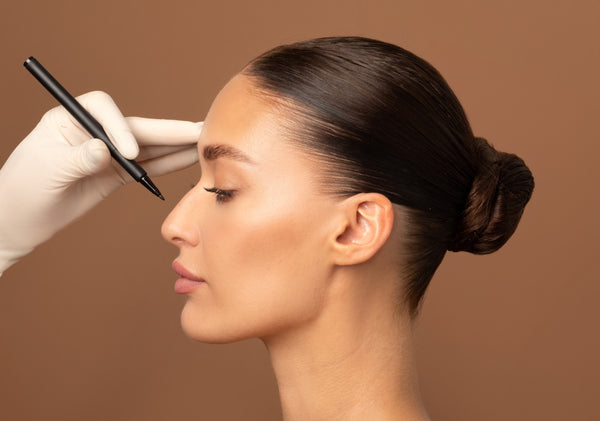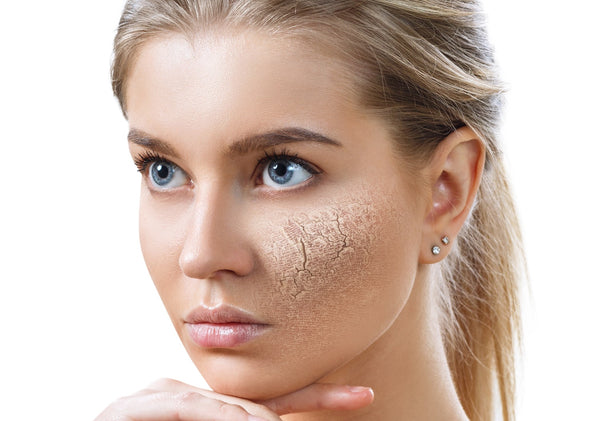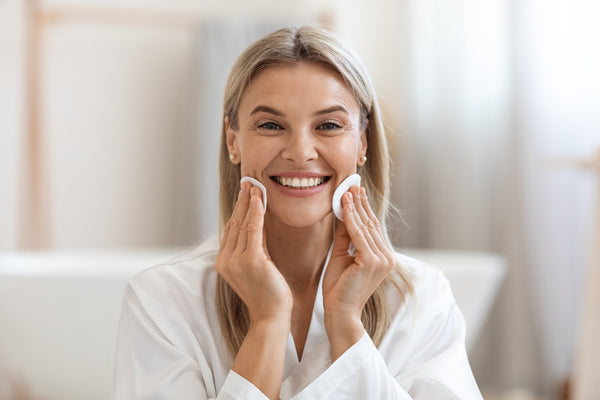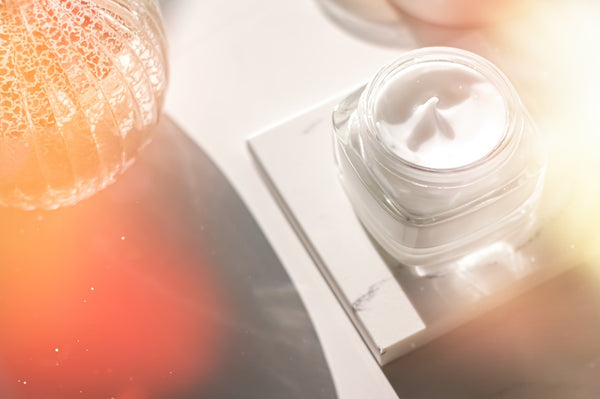Understanding Your Hormones & How They Impact Your Skin

Hormones can be a tricky concept to grasp, especially when it comes to how they affect your diet, mood, body, weight, and even skin. In this read, we're going to debunk the need to know about understanding your hormones and how they impact your skin along the way!
Ever notice your skin is more susceptible to breakouts at different times of the month no matter how on top of your skincare and diet regimens you are? Those pimples just seem to pop up out of nowhere. On other days, you may experience dry patches. What gives? Estrogen, progesterone, and testosterone are the three hormones that fluctuate throughout the duration of your menstrual cycle, sending your skin into a tailspin all month long.
For women, estrogen aligns with life's significant transitions. It rises during puberty, trickles during pregnancy, and decreases during perimenopause and menopause. Interesting right? Estrogen is a key hormone for women and it's important to know how vital of a role it plays in our day-to-day lives beyond mood fluctuations - but skincare.
 Your skin is filled with estrogen so finding skincare products that cater to your skin changes should be at the top of your list. When estrogen dips from the body and skin during that time of the month or even menopause, so does collagen which means more fine lines, wrinkles, dryness, and loss of elasticity.
Your skin is filled with estrogen so finding skincare products that cater to your skin changes should be at the top of your list. When estrogen dips from the body and skin during that time of the month or even menopause, so does collagen which means more fine lines, wrinkles, dryness, and loss of elasticity.
Another hormone that plays a key role in the skin's appearance is cortisol which is the stress hormone. This hormone is especially significant because stress is more common than not and less likely to be managed daily. Ironically, while most women believe that their cortisol's level is high, studies show that many women with low levels indicates a sign of adrenal fatigue which in fact, affects the skin. When the cortisol hormone is high, your skin produces more excess sebum and ultimately results in a cycle of acne breakouts.
Here’s a quick cheat sheet to help you handle all the hormonal havoc and adjust your skincare routine accordingly, so you can help combat complexion chaos:
 Days 1-6: the duration of menstruation, is when all three hormones are at an all-time low, which means sebum production may decrease, leaving skin looking lackluster and dull. So, amp up the moisture levels with your MD Glam DMAE Antioxidant Day Moisturizer as well as your MD Glam Hyaluronic Acid Night C-Complex come nighttime.
Days 1-6: the duration of menstruation, is when all three hormones are at an all-time low, which means sebum production may decrease, leaving skin looking lackluster and dull. So, amp up the moisture levels with your MD Glam DMAE Antioxidant Day Moisturizer as well as your MD Glam Hyaluronic Acid Night C-Complex come nighttime.
Days 7-11: your body begins to pump out the skin-smoothing estrogen, which helps stimulate collagen and elastin production. Since these new cells are forming, help boost cell turnover by focusing on both physical and chemical exfoliation. What better time to buff away the old and bring in the new with your MD Glam Exfoliating Enzyme Scrub that offers both physical (pineapple stem powder) and chemical (glycolic acid) exfoliation.
Days 12-16: (ovulation) estrogen production peaks sending you into goddess skin status. Complexion is plump, dewy, glowy, and sensational looking! Take advantage of your skin’s receptivity by keeping up with your MD Glam Retinol-C Intense Eye Serum for the added collagen boost. Now is NOT the time to slack on your skincare no matter how tempting.
Days 17-24: this is the end of ovulation when progesterone starts to take over, causing sebum production to go into overdrive. Keep breakouts at bay by using your MD Glam Exfoliating Enzyme Scrub as a mask to help detox pores of impurities.
Days 25-28: is the start of the PMS season. Progesterone and estrogen dip, while testosterone takes over your mood and your mug. This is the time you may experience a hit of hormonal acne across chin and along the jawline. Stay vigilant with your MD Glam go-to’s, keep complexion clean, cut refined carbs and dairy (sorry chocolate!), and increase your Omega-3 fatty acid content (fish, walnuts, seeds) and leafy green content.
How to balance hormones for better skin?
- Cut out or cut back on:
- Dairy
- Sugar
- Gluten
- Alcohol
These foods and drinks cause inflammation in the body which throws off your hormones and negatively impacts your skin.
2. Opt for these:
- Eat more greens
- Eat clean protein
- Add healthy fats
These foods will help balance nutrients, antioxidants, cellular-level building fats, and cellular protein, to ensure your hormones balance and your skin are healthy.
3. Know your food sensitivities
- Be sure to identify foods that irritate or have a hard time breaking down. Many people connect flare ups in their skin condition with the foods they consume. Dairy and eczema is a very common case of this.
4. Promote active digestion
- Water
- Fiber
- Probiotics
- Magnesium Citrate
Frequent restroom visits daily means that your body is detoxifying properly. Estrogen recirculates through your system, leading to hormone imbalance. Other toxins can recirculate and cause inflammation - and no one wants that.
5. Monitor your stress levels
- 10 minutes of meditation
- 10 to 15 minute daily walk
- Breathing exercises
Stress is the #1 trigger to activate the cortisol hormone which in part causes immune dysfunction, inflammation, and hormone imbalances. Studies have shown that daily meditation helps lower cortisol levels tremendously.
6. Add probiotics to your routine
Making it a habit to incorporate probiotics into your daily routine will make all the difference. Probiotics move your microbiome which is the important population of bacteria that lives in our digestive tracts. They are responsible for the health of our intestinal lining, and the modulation of our immune system. Taking one probiotic a day will help ensure the microbiome is healthy and helps the immune system from producing too much inflammation or bloating.
Understanding how your body adapts and reacts to particular, yet common, hormones will help you get to prevent your skin from raising more havoc than it already has. We encourage you to listen to your body, and give it the nutrients and proper care that it needs to flush out the bad and welcome all of the good. After all, who doesn't want a healthy, happy, and strong body with glowing, radiant skin?
Which precautionary tips will you be taking to ensure a balanced hormonal level? Let us know in the comments below!









